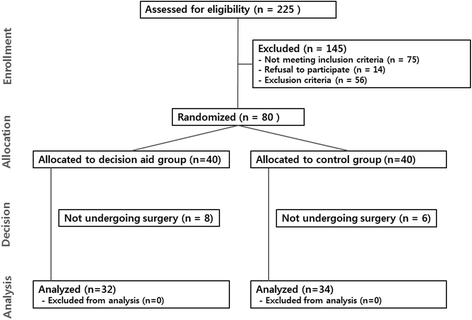Use of a decision aid did not decrease decisional conflict in patients with carpal tunnel syndrome
- PMID: 28320368
- PMCID: PMC5360048
- DOI: 10.1186/s12891-017-1478-4
Use of a decision aid did not decrease decisional conflict in patients with carpal tunnel syndrome
Abstract
Background: Although a model for shared decision-making is important for patient-centered care, decisional conflict can emerge when patients participate in the decision-making. A decision aid is proposed to provide information and to involve patients more comfortably in the decision-making process. We aimed to determine whether a decision aid helps patients with carpal tunnel syndrome (CTS) experience less decisional conflict regarding their decision-making for surgery.
Methods: Eighty patients with CTS were randomized into two groups. The test group was given a decision aid in addition to regular information and the control group regular information only. The decision aid consisted of a 6-min videoclip that explains diagnosis and information regarding surgery for CTS with other treatment options. We evaluated patients' decisional conflict regarding surgery, knowledge about CTS, and symptom severity as measured by the Disabilities of Arm, Shoulder, and Hand (DASH) Questionnaire.
Results: There was no difference in the decisional conflict scale (DCS) between both groups (p = 0.76). The test group had significantly better knowledge than the control group (p = 0.04). There was no correlation between the knowledge score and the DCS (p = 0.76). However, less severe symptoms were correlated with greater decisional conflict (r = -0.29, p = 0.02).
Conclusions: We found that a decision aid does not reduce decisional conflict in patients with CTS, although it can help them be better informed. This study suggests that although a decision-aid is effective for patient education, doctor-patient communication should be more emphasized for patients with less severe symptoms, as they can have greater decisional conflict.
Trial registration: SNUBH Registry 1510/317-003 Registered November 13, 2015.
Keywords: Carpal tunnel syndrome; Decision aid; Decisional conflict; Knowledge.
Figures
References
-
- Nathan PA, Keniston RC, Myers LD, Meadows KD, Lockwood RS. Natural history of median nerve sensory conduction in industry: relationship to symptoms and carpal tunnel syndrome in 558 hands over 11 years. Muscle Nerve. 1998;21:711–21. doi: 10.1002/(SICI)1097-4598(199806)21:6<711::AID-MUS2>3.0.CO;2-A. - DOI - PubMed
-
- Resende LA, Tahara A, Fonseca RG, Sardenberg T. The natural history of carpal tunnel syndrome. A study of 20 hands evaluated 4 to 9 years after initial diagnosis. Electromyogr Clin Neurophysiol. 2003;43:301–4. - PubMed
Publication types
MeSH terms
LinkOut - more resources
Full Text Sources
Other Literature Sources
Medical
Research Materials


